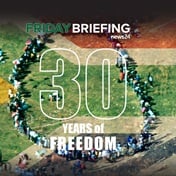
Up until this last week, President Cyril Ramaphosa seemed somewhat isolated within his own party. The swirling controversies surrounding the CR17 donations saga had left him exposed and vulnerable – at least if you believed the Twitter-centred onslaught against him which even resulted in a venomous yet trending #ramaphosamustfall hashtag.
By the end of the week, it all looked marginally better. Jessie Duarte, secretary general of the ANC, penned a defence of her president. The ANC in KwaZulu-Natal backed Ramaphosa in a public statement against the "sustained public assault" against him.
In addition, there were legal fightbacks from Ramaphosa-aligned supporters like Derek Hanekom and Lesetja Kganyago suing former president Jacob Zuma and ANC Nelson Mandela Bay councillor Andile Lungisa respectively for adding to the toxic domestic debate.
Still, it all seemed a little thin. The ANC was attempting a band-aid job to patch up a wounded president who also seemed caught in the headlights of these internecine battles raging around him.
And, with the rand crashing and equity markets in turmoil, it took a somewhat frustrated Pravin Gordhan to make an unsolicited call to Bruce Whitfield's Money Show to calm jittery investor nerves and prop-up a mooted restructuring plan for Eskom soon to be announced by the president.
Despite some internal ANC support for the president, Ramaphosa remains at the helm of a very unstable ship. Over the next few months, there are at least five flashpoints which are likely to test ANC unity to the hilt. Considering the breadth of issue and complexity of context, each pressure-point would be enough to harm the governing party on their own. That they all come more-or-less simultaneously suggests a period of extreme instability for the party of liberation.
1. The Public Protector
With each successive week, South Africa's legal system is contributing to a case file against the continued office of Busisiwe Mkhwebane.
While the DA and others will attempt to begin a parliamentary (and legal) procedure to remove her from office, it will probably be the ANC caucus (and even the inner-sanctum of the NEC) that would eventually have to decide her fate.
Mkhwebane has effectively polarised the ANC for or against her appointment. Those who continue to wish to undermine the Ramaphosa presidency want her to stay – under the guise of protecting the integrity of the institution at all costs – while those who argue that she is intentionally (or unintentionally) aiding and abetting an anti-Ramaphosa agenda would like to see her gone and will use the ever-increasing High Court smackdowns against her as motivation.
The battle lines are starkly drawn – and she has largely contributed to them herself. But the battle is more than just about her position. It reflects all the characteristics of the larger Zuma/ Ramaphosa conflict. And, should she be removed, it will be an undeniable victory for the Ramaphosa faction.
This issue is therefore potentially the biggest internal showdown that Ramaphosa has yet to face within his own party. On the basis of her recent actions, Ramaphosa's own presidency looks set to continue to be destabilised should she remain in office, yet her removal could do exactly the same by polarising factions and hardening already held views. The next few months will therefore be critical for the ANC as the issue plays itself out in full view of an anxious public gallery.
2. The debt conundrum and economic policy
The well documented bailout for Eskom and ongoing drain on the fiscus by additional SOE failure now threaten to push South Africa's debt-to-GDP well over the 60% mark and flash red for the ratings agencies. Clearly, it is not just about restructuring Eskom, but now about a broader review of the turmoil in the current state funding model and government expenditure in particular.
It would seem that government will have to consider a restructuring or the implementation of a dreaded "austerity" plan to reduce its head-count and other forms of excessive expenditure.
Within the context of a state-driven developmental political party like the ANC, this is highly risky. With bureaucratic numbers under threat, the unions are sure to voice their displeasure. And – not forgetting – they were a major component of the Ramaphosa support team too.
Managing a downsizing under these circumstances is fraught with political risk. Of course, the alternatives are the vexed IMF bailout or a risky deployment of prescribed assets from pension funds into state bonds to offset debt. Either way, President Ramaphosa faces immense push-back from anything that smacks of job losses. It's yet another pressure-point virtually at boiling point.
More broadly, the pressure-point of the SOEs is also that of the economy. Amidst a deteriorating domestic financial environment, the lack of economic progress may also undermine the president's authority and increase the voice of a more radical or populist faction.
Dealing with the economy and its rescue is therefore a potential risk – but also an opportunity to boost support if adequate corrective measures are implemented. Still, battle lines over land and the NHI will pry open broader divisions within not only South African society but also internally within the ANC as the reality of the state's spending capacity and its attractiveness to the outside world clash with the dictates of previous ANC policy outcomes.
3. Patronage opportunities decline
When the ANC declined to 57% of the popular vote in the May election, their caucus size was reduced. With that reduction went jobs and a number of support positions.
And, with government spending under the spotlight and some sort of avowed intention to reduce patronage-based business opportunities within the state sector, those seeking to use the ANC as an extension of rent-seeking or as an opportunity for profit extraction will be under pressure.
Even since 1994, the ANC has been more than just a conventional political party. It has embodied a quasi-entrepreneurial party for the elites and well-connected. While this is unlikely to end, it may just be less prevalent or more guarded in its voracity and scope.
When careerists find it tougher to extract salaries and profits from the ANC, expect another layer of tension as the party once seen as an open-ended treasure-chest for cadres now faces its own internal recession.
4: The ANC in KwaZulu-Natal
Despite their support for Ramaphosa this week, the ANC in KwaZulu-Natal remains deeply divided. And of course, the axing of Durban mayor Zandile Gumede piles on the pressure.
In an country crying out for some type of action against those accused of malfeasance, the move was, perhaps, the bravest public signal around restoring integrity to public officials at the highest levels.
But, Gumede's departure will flesh open existing wounds. She will clearly harbour resentments about the new course of ANC leadership and her very vocal supporters will see this as the continuation of a factional battle for control within the broader party.
While possibly a litmus test to see the extent of political fallout following a high-profile axing, Gumede will probably not be the last to face the chop. She can position herself and her followers (including elements within the ANC Women's League) internally as a power block keen to take political revenge at some point in the future. Not to mention Zuma still on the sidelines but seemingly prepared to lend a hand to fracturing his own party for political gain.
As the new National Prosecuting Authority (NPA) moves closer to possible arrests, a period of further internal instability can ensure – one that we are perhaps already in. When comrades are fired – or indeed arrested – this too will add to Ramaphosa's stress levels.
5. The CR17 donations shambles
Make no mistake, the confusion surrounding the donations to the Ramaphosa presidential campaign hold within them further areas of strain for the governing party. Clearly, much more needs to be explained and the courts themselves will judge the matter. Yet other leaks and claims of impropriety should not be ruled out as those keen to undermine the president find themselves under further pressure.
The matter should have taught the president a number of lessons. He needs to be not only better informed of sensitive issues, but he also needs a much more effective communications strategy to combat potentially awkward leaks into the public domain.
These leaks, their procurement by the Public Protector and media houses indicate that President Ramaphosa has a series of political enemies keen to undermine his authority. He needs to get ahead of the debate and control the discourse before it controls him. So far, it's been tenuous but further investigations and greater transparency can clear the air.
Still, the president has been undermined by the accusations – even if most seemed to epitomise "fake news" and manufactured outrage from his opponents both inside and outside the ANC.
The danger here is that if Ramaphosa comes through this ordeal (and I suspect he will), he cannot possibly face another embarrassment such as this. And, if his enemies are circling, you can bet your bottom dollar they will seek another angle to exert additional damage. The defence of the president will therefore occupy the minds of the factions and can continue to boil over in different formats.
These five areas are not exclusive. Within each are a host of additional nuances posing risks to the internal stability of the ANC. What is required is strong leadership and a confidence to move forward.
But the depth of the internal challenges within the ANC are such that we might be nearing a point where a more mature realignment of South African politics is on the cards.
The president, therefore, might well need the support of those not in the ANC – as much as he needs his own faction to come through for him. Our mindset of narrow party interests and allegiances should therefore be much broader as testing but interesting times approach.
- Daniel Silke is director of the Political Futures Consultancy and is a noted keynote speaker and commentator. Views expressed are his own. Follow him on Twitter at @DanielSilke or visit his website.
Disclaimer: News24 encourages freedom of speech and the expression of diverse views. The views of columnists published on News24 are therefore their own and do not necessarily represent the views of News24.




 Publications
Publications
 Partners
Partners























